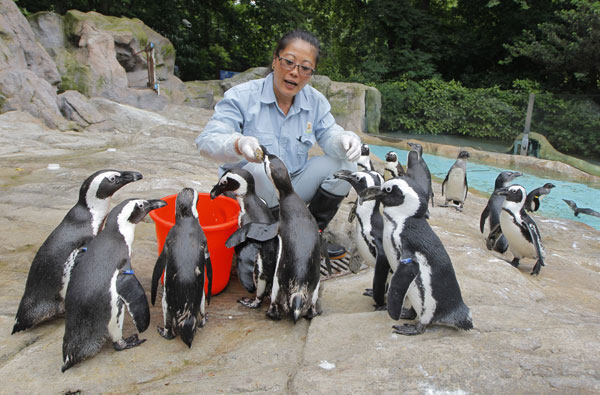
So what's black and white and red all over?
A penguin with mosquito bites.
"You'd be proven wrong if you thought heat is our penguins' biggest enemy during summer," said Jin Jun, a penguin keeper at the Shanghai Zoo.
"Mosquitoes are."
 |
|
Jin Jun feeds penguins at the Shanghai Zoo last month. Gao Erqiang / China Daily |
She said that unlike the Emperor Penguin, which can only be found in cold climates - and only a few species live that far south - African penguins adapt better to the hot summer temperatures.
"But the strange thing is I kept finding these tiny red spots that looked like sties on each penguin's upper eyelids almost every summer and I couldn't figure out what they were," Jin said.
"That kept puzzling me until one day I was driven crazy by the annoying mosquitoes in the zoo - and I suddenly realized my little flightless fellows were covered with feathers from head to toe except their eyelids!"
The 43-year-old has since used a liquid mosquito killer to keep the insects at bay.
After 10 years working with the penguins at the zoo, Jin knows the personalities of the 33 birds in the penguin building and can recall where the ancestors of each came from - zoos in Japan and the Netherlands - despite the fact they're African penguins.
Yet even in the partially enclosed environment that is equipped with a cool pool, air conditioning is still necessary for the penguins in the 34 C summer.
"We hide three air conditioners under the rocks so that zoo-goers won't see them," Jin said, pointing to one and adding that they're the penguins' favorite spots during summer.
Adult African penguins usually grow to 70 centimeters tall and weigh between 2 and 5 kilograms, Jin said. They have a black stripe and black spots on their chests, and the pattern is unique for every penguin, like human fingerprints.
"It's the cutesy-cutesy," said Jin, who has the wholesome, patient, competent-in-the-wild style every mother would want for her child's camp counselor.
"People say, 'Ohhh, they look like they're wearing little tuxedos.' As an animal person, I don't care for it. I would rather see respect for the animal. They look the way they do for a particular reason. When they swim in the ocean, for the predators, looking up, white is hard to see. Looking down from above, the black is camouflage."
According to Jin, penguins are social animals, and when she opens the door to the enclosure a young penguin rubs its head against her leg.
"They're like a dog or cat that needs patting from its owner. Once I pat them, they'll make a funny bray," she said.
African penguins are also known as "jackass" penguins for their donkey-like bray.
Before feeding them, Jin prepares hearty little fish by shoving a vitamin tablet into their gills. For penguins with less appetite, Jin has to open their beaks and ease the fish down their gullets.
"You've got no idea how picky these penguins are. They'd only eat the best part of the best fish," said Jin, who was once a handler for sea lions.
Jin arrives every morning at 7:30 and often works a nine-hour day, washing the enclosure, thawing the fish and caring for the birds. But one less-frequent duty for Jin is to play matchmaker.
"But I'm a bad one," joked Jin, adding she couldn't stand the sight of a lonely penguin in the corner.
"It doesn't matter how hard I tried by leaving two penguins in the same room or creating opportunities for them. I could never get them to successfully fall in love - penguins are birds that believe in free love."
Jin's connection with animals is not limited to penguins. She's also close to the tigers and lions in the zoo because her husband, Zhang Zhixin, works in Shanghai as their keeper.
"I knew Jin from work but both of us were keepers for herbivores back 15 years ago," Zhang said.
Now the handler for meat-lovers, Zhang is in charge of six South China tigers and four lions with his colleague.
"We don't have direct contact with tigers and lions if you're talking about touching them or patting them. No, that's forbidden, especially after the accident," Zhang said.
A tiger handler was killed by a tiger two years ago in the Shanghai Zoo.
Zhang said he's not afraid of the big cats and taking care of them has already become part of his daily life.
A total of 140 keepers work in the Shanghai Zoo to look after more than 6,000 animals there.
Contact the writer at shiyingying@chinadaily.com.cn







